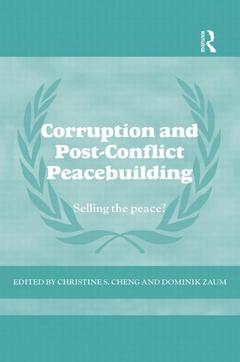Corruption and Post-Conflict Peacebuilding Selling the Peace? Cass Series on Peacekeeping Series

This edited volume explores and evaluates the roles of corruption in post-conflict peacebuilding.
The problem of corruption has become increasingly important in war to peace transitions, eroding confidence in new democratic institutions, undermining economic development, diverting scarce public resources, and reducing the delivery of vital social services. Conflict-affected countries offer an ideal environment for pervasive corruption. Their weak administrative institutions and fragile legal and judicial systems mean that they lack the capacity to effectively investigate and punish corrupt behaviour. In addition, the sudden inflow of donor aid into post-conflict countries and the desire of peacebuilding actors (including the UN, the international financial institutions, aid agencies, and non-governmental organisations) to disburse these funds quickly, create incentives and opportunities for corruption.
While corruption imposes costs and compromises on peacebuilding efforts, opportunities for exploiting public office can also be used to entice armed groups into signing peace agreements, thus stabilising post-war environments. This book explores the different functions of corruption both conceptually and through the lens of a wide range of case studies. It also examines the impact of key anti-corruption policies on peacebuilding environments. The dynamics that shape the relationship between corruption and the political and economic developments in post-conflict countries are complex. This analysis highlights that fighting corruption is only one of several important peacebuilding objectives, and that due consideration must be given to the specific social and political context in considering how a sustainable peace can be achieved.
This book will be of great interest to students of peacekeeping and peacebuilding, criminology, political economy, war and conflict studies, international security and IR.
Acknowledgements List of Acronyms Contributors Selling the Peace? Corruption and Post-Conflict Peacebuilding Christine Cheng and Dominik Zaum Part I: Conceptualising Corruption in Peacebuilding Contexts: Part II: Case Studies Part III: Anti-Corruption Measures in Peacebuilding Contexts Bibliography Index
Christine S. Cheng is Bennet Boskey Fellow in Politics and International Relations at Exeter College, University of Oxford.
Dominik Zaum is Reader in International Relations at the University of Reading and author or editor of several books, including The Sovereignty Paradox: The Norms and Politics of International Statebuilding (2007).
Date de parution : 06-2013
15.6x23.4 cm
Date de parution : 08-2011
15.6x23.4 cm
Mots-clés :
sierra; leone; transparency; international; practices; contexts; crisis; group; 1999a; extractive; EITI Implementation; EITI Report; OHR; International Crisis Group 1999a; Humanitarian Aid; UNDP 2010a; BiH; Vice Versa; Public Administration; Postconflict Countries; EITI; Revolutionary United Front; RUF; Civil Society; Postconflict Settings; Post-conflict States; Civil Society Organisations; Thermo Electric Power Plant; Consociational Institutions; SME Sector; EITI Process; Independent National Electoral Commissions; Anti-corruption Activities; Extractive Sector; Fragile Post-conflict States



